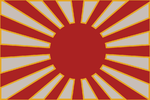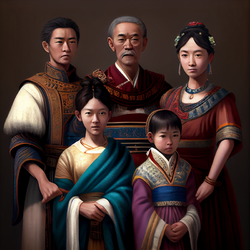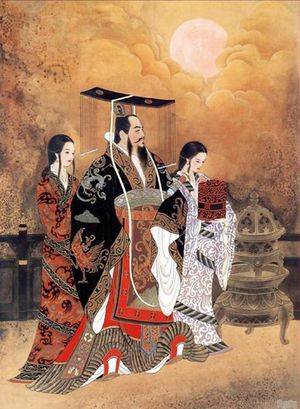Jing
- "Jingdaoese" redirects here. For the language, see Jingdaoese language.
| Jingdaoese people People of the Pure Path | |
 Flag of the Jingdaoese people | |
| Total population | |
|---|---|
| Around 170,000,000 - 180,000,000 | |
| Regions with significant populations | |
| 170,000,000 | |
| 3,630,000 | |
| 871,205 | |
| c. 700,000 | |
| Languages | |
| Southbatavian, Jingdaoese, Kildarian Istvanistani, Praeta | |
| Religion | |
| Tianchaodao | |
| Related ethnic groups | |
| Hondonese, Batavian | |

The Jing (淨族, jìngzú) are sometimes wrongly referred to as the Jingdaoese (淨民, jìngmín), which was used to group the several population groups of Jingdao. Post-1707 AN Jingdaoese became more commonly used to refer to the citizenry of the Duchy of Jingdao, or the ethnic group (especially thanks to negligence towards the ethnic and cultural differences in the Eastern Imperium). They are also called People of the Pure Path or Travelers of the Pure Path and are an ethnic group which primarily inhabits the regions that once belonged to the Empire of Jingdao, which was located on Apollonia. While its people rose to prominence during the reign of the Haman Emperor in 1583 AN, its origins can be traced back to the mythical Ying Emperor who united the Eight Tribes into one realm in 351 bAN.
The almost unwavering and blind loyalty and devotion for their Heavenly Light has made the Jing's habits a frequent topic of conversation among scholars. Those who do not follow the teachings of the Heavenly Light are seen as "fallen Jingdaoese". For the purpose of investigating those cases, Unit 666 was established.
Language
- See also: Jingdaoese
The Jingdaoese language has a writing system that consists of characters, which represent words or phrases rather than individual sounds. A Kildarian dialect of Istvanistani, of which the widespread introduction can be traced back to when Kildare was conquered by Kaiser Gaelen I, is however also used in daily interaction. Jingdaoese is taught in schools from a young age, even to non-Jing like the Kildari, and all traditional religious scriptures are written in it.
During the colonial era (between 1526 and 1583 AN), when the original Ancient Jingdaoese homeland in Cibola was colonised by the Batavians, Southbatavian (a dialect of Batavian) became an important language in daily life. During the reign of the Haigui Emperor in 1623, and with Her integration of Kildare into the Realm, Kildarian Istvanistani became the dominant language used at the Imperial Court. As most subjects spoke Istvanistani, the use of Southbatavian and Jingdaoese became primarily became limited to private discussions. This was eventually countered by a series of intensive educational reforms half-way the 17th century. By the end of the reign of the Chidao Emperor, Jingdaoese was undoubtedly the most important language spoken within Jingdao.
Ideologies

The Jing People define themselves as separated from other ethnic groups. They see themselves as defenders of humanity and understand the need of sacrificing themselves from time to time to protect the world against evil demons, called baishens. Their radical attitude and the servitude towards their Heavenly Light results in common misunderstandings with other racial and culture groups.
As the Jing believe that the Gods have chosen the Jing as protectors and seekers of Purity, they firmly believe that the Emperors act as the most important guide in this world. This made the Heavenly Throne, and their loyalty towards it, into the most defining characteristic of these people.
After the reintegration of Jingdao in the Imperial Republic of Shireroth, devotion to the Heavenly Light was used to tie the Jing to the Mango Throne: despite the decades of conflict between Shireroth and Jingdao, many residents accepted Kaiseress Salome with relative ease as an important pillar of its society and culture (defender of the faith, wearer of the Heavenly Mandate and earthly leader of the country).
Militarism, with some minor exceptions like during the reign of the Jinken Emperor (1608 - 1610), is entrenched in its society and heavily promoted. Jingbuism is a red line in all government policies. This eventually led, during the Erasmii Dynasty, to growing tensions between the Bureaucrat, the Army and the Navy Factions at the Court in which all three try to influence the Emperor and - in less degree - the National Diet.